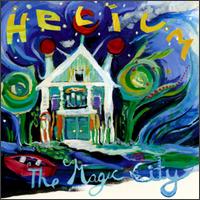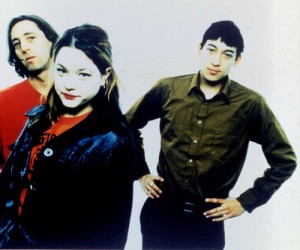FOREWORD: I originally met singer-guitarist-violinist Mary Timony in the downstairs backstage at Tramps. She was going out with Polvo guitarist, Ash Bowie, whose band was breaking up. This was Polvo’s last New York City gig and it was completely sold out. Bowie then teamed up with Timony in abstruse art-pop outfit, Helium (pictured below), whose second LP, The Magic City, was promoted by the following December ’97 piece.
When Timony split from Bowie, Helium was no longer. But Timony went on to record a few successful small-scale long-players: ‘00s Mountains, ‘02s The Golden Dove, and ‘05s excellent Ex Hex. What I like best about Timony is she doesn’t mince words. This article originally appeared in Aquarian Weekly.
Helium frontwoman, Mary Timony, enlivens impressionistic prog-rock without becoming superficial on the ambitious sophomore long-player, The Magic City. After Helium hit indie paydirt with ’95s blustery feedback-drenched The Dirt Of Luck – a sonic corruption bewitched by subversively fragile sentiments, Boston-based Timony resolved her post-teen uncertainties and decided to trade in the droning cacophonies of yesterday for a cosmic experiment.
Brilliantly derived from Baroque, Gaelic folk, and neo-Classical styles, The Magic City takes a surrealistic journey forward (the artful “Aging Astronauts” and the astral “Leon’s Space Song”) and backward (the harpsichord-laden Medieval People” and the shadowy “Ancient Cryme”) in time.
Emotionally as well as musically more assured, Timony gives bassist Ashley Bowie (who splits time playing guitar in skewed Chapel Hill rockers, Polvo) and drummer Shawn Devlin a more active role in expanding Helium’s paradigm-shifting soundscape. The sullen demonic sulking pervading The Dirt Of Luck has been expelled by the malleable inclinations and imagistic sorcery of The Magic City.
In lesser hands, this turnabout would be a disastrously pretentious obsession better left unexplored. But through the swell production of Mitch Easter (R.E.M. / Pavement), Timony’s fully realize fictional accounts convey true emotion and dramatic intensity.
I spoke to Timony over the phone Thanksgiving weekend.
 The Magic City sidesteps the angst-ridden conviction of its predecessor. There’s a genuine poetic luster that shines through.
The Magic City sidesteps the angst-ridden conviction of its predecessor. There’s a genuine poetic luster that shines through.
MARY: The sentiments were angrier on The Dirt Of Luck’s songs. They were more aggressive and agitated, but there were some nicer songs on that record. Since the production was lo-fi, they came out sounding more distorted and noise-oriented. I think the themes were more urban and about inner turmoil and gender gaps. Now I feel the themes on the first album were overdone and so ‘over’ now. There are so many cheesy women musicians around because of the whole Alanis Morissette fake feminism thing. I got tired of it. I had huge writer’s block and couldn’t produce new music for a while. But then I realized the music I like is soothing and has balance. I didn’t want to use my music as just a tool. That’s why The Magic City is quieter and more mellow. I decided I wanted to make music and not deal with the bullshit anymore.
Many of your earlier songs dealt with gender gaps. Do you feel women are still deprived in America?
MARY: That’s a complicated issue. I just think it’s a huge intricate web that can’t easily be summed up. I don’t want it to seem that I have these very specific ideas. Some of my personal experiences have led me to believe men are encouraged to have high self-esteem. And that’s commonly known. But I can’t say I have specific songs about gender relations. It’s just a feeling that may exist in some of our songs. Women are encouraged not to speak highly of themselves sometimes. They’re trained to be in a subversive role.
What misconceptions do men sometimes have towards women?
MARY: That’s also complicated. I don’t encounter such prejudice in music anymore. When I was young I encountered it more. What was frustrating for me was on the first album I felt I took on this sarcastic prostitution persona. Critics and fans thought I was just trying to act sexy so I tried to move away from that persona.
So you’ve come to terms with yourself?
MARY: Yeah. I think so. I try to.
 Did Mitch Easter’s levelheaded production make The Magic City a more pop-oriented and accessible album?
Did Mitch Easter’s levelheaded production make The Magic City a more pop-oriented and accessible album?
MARY: He really knew what he was doing and he was amazing dealing with different sounds. A lot of times he’d spend time by himself making sure everything was working out. He did digital edits and had loads of instruments to work with. Besides being really skilled, he’s also fun to hang around with and makes the recording process fun. I wrote out some violin parts and he got this really good violinist from an orchestra to play on that song.
If your debut was a radical departure from the conservative training you received at Ellington School of Music, then was The Magic City a justification of your education?
MARY: I was sick of learning music in school and decided to make a non-musical album right away. So after I got that out of my system, I got writer’s block, got burned out on angry music, and wanted to make constructive music again. I realized I had to start over again because I felt I had lost some of my guitar techniques.
Is that why you partly rely on Baroque music for the new album?
MARY: The Baroque stuff comes out of my schooling – playing easy Classical pieces. Ashley and I sort of connect with old music. I like music from the Middle Ages and Ash likes music from different cultures. I was into whatever my hippie brother was into when I was young. That’s where I got the classic rock influences.
What was the first live show you attended?
MARY: My first show was probably the Culture Club. Then I saw the Rites Of Spring. They were my favorite band when I was 13.
Does touring put a strain on you after awhile?
MARY: I don’t mind touring when there’s time to relax. But it gets hectic and tiring. We’ve been on tour now for two months. This time it has been stressful, but it has also been fun.
Do you feel the need to remove yourself from the more surreal songs you compose?
MARY: There’s a million ways to analyze it. From a psychological standpoint, the new album was a move away from expressing anger. The lyrics deal with a person moving away from anger and into this beautiful fantasy world.
Where do you get your inner rage from?
MARY: I don’t know. I’ve never been good at expressing anger in real life. I hold it in. But I’ve been known to throw temper tantrums. (laughter)
If you had to change one song or arrangement on the new album, what would it be?
MARY: Oh, let’s see. “Vibrations.” I can’t stand that song. I’m sick of it.
One of my favorite songs is the sonic convulsion, “Lady Of The Fire.” It seems to deal with a strong woman whose dignity, freedom, and perseverance never subside.
MARY: It’s like unzipping your body and stepping outside to let it all hang out and say the most insane things because you’re sick of holding it all in. It’s no-hold-barred. It’s also related to this musical monster characterized on our debut EP, Pirate Prude. It’s kind of me, but also a larger than life figure.
What do you perceive to be the next step for Helium?
MARY: As a musician, you get tired of what you’re doing and want to change. We never intentionally try to change styles. It just happens naturally. You just make music, it comes out, and it’s labeled by the people.
